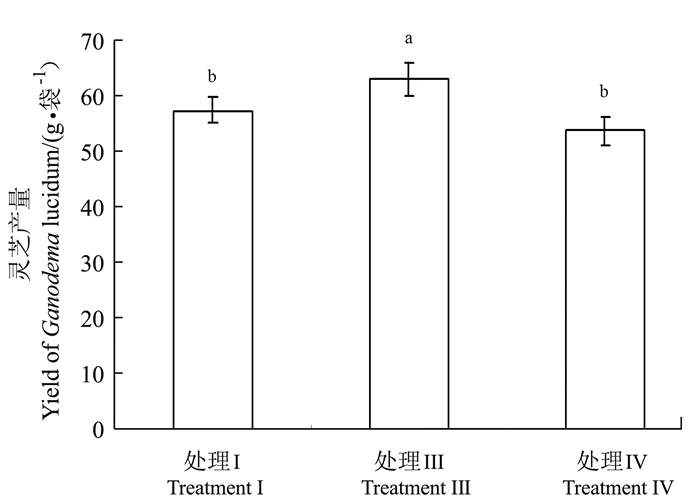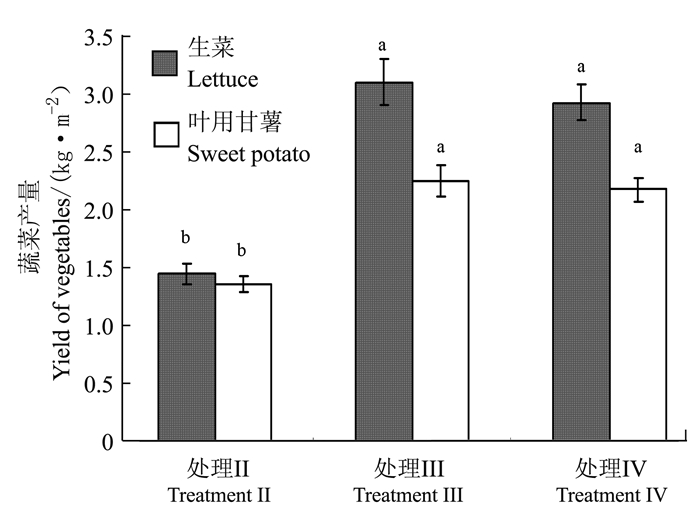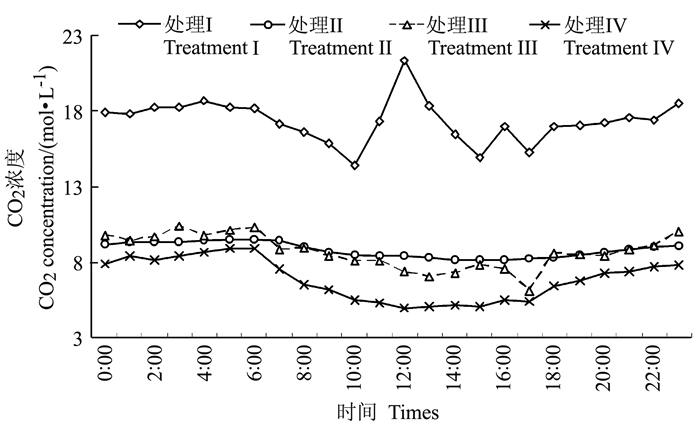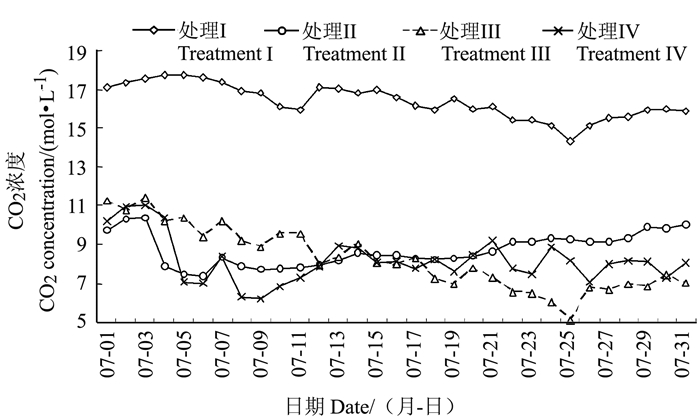Intercropping Ganoderma lucidum and Vegetable for Improvements on Crop Yield and CO2 Emission
-
摘要:目的 探讨菌蔬温室间作下不同食用菌和蔬菜数量配比对其互作效应的影响,为设施菌蔬间作技术研究与应用提供科学依据。方法 利用温室控制试验研究了不同灵芝-蔬菜温室间作栽培对蔬菜生长和灵芝碳素转化利用的影响,以及温室内CO2浓度变化差异。结果 蔬菜单作模式下温室内CO2浓度日变化较为平缓,菌蔬间作模式下灵芝培养料中的碳素以呼吸消耗的形式排放(占总碳量的51.62%~52.46%),导致温室内CO2浓度夜间处于较高值,白天显著下降。灵芝+蔬菜间作模式灵芝产量比灵芝单作和灵芝(减半量)+蔬菜间作方式分别提高了9.8%和23.6%;生菜和叶用甘薯产量也比蔬菜单作和灵芝(减半量)+蔬菜间作方式有不同程度提高。结论 合理的菌蔬间作可提高蔬菜和食用菌的产量,达到增产增效和CO2减排的目的,其中以灵芝-蔬菜间作模式效果较好。Abstract:Objective Effects of fungi-vegetable intercropping on crop yield and environmental CO2 were studied.Method By intercropping Ganoderma lucidum and vegetables in varied ratios, the plant growth, carbon transformation and CO2 emission were monitored in a confined chamber.Result The daily CO2 emission of vegetable cultivation was relatively constant. But the intercropping induced significant variations. It was heightened at night and declined in daytime as carbon was discharged as CO2 from G. lucidum (accounting for 51.62% to 52.46% of total carbon emission). The fungal yield under the total-and half-G.lucidum intercropping increased by 9.8% and 23.6%, respectively. The intercropping raised the yield of lettuce or leaf sweet potato to different extends.Conclusion By cultivating G. lucidum along with vegetables, crop yields benefitted, and at the same time, CO2 emission from the cultivation was reduced.
-
-
表 1 不同栽培方式下灵芝的基物失重情况
Table 1 Weight loss of G. lucidum under different intercropping treatments
栽培方式
Intercropping
mode培养料干重
Dry weight of medium
/(kg·袋-1)培养料失重
Weight loss of
medium/%子实体干重
Dry weight of fruit body
/(kg·袋-1)绝对生物学效率
Absolute biological
efficiency/%呼吸消耗
Respiratory
consumption/%处理Ⅰ Treatment Ⅰ 310.65 55.50 22.97 7.39 48.11 处理Ⅲ Treatment Ⅲ 310.65 56.24 25.21 8.11 48.13 处理Ⅳ Treatment Ⅳ 163.50 56.80 10.74 6.57 50.24 注:培养料平均失重%=(A-B)/A×100, 其中A表示培养料干重,B表示培养后料干重;绝对生物学效率%= C/A×100,C表示子实体干重;呼吸消耗%=(A-B-C)/A×100。
Note: Weight loss on substrate (%)=(A-B)/A×100,absolute biological efficiency (%)=C/A×100,and respiratory consumption (%)=(A-B-C)/A×100,where A=substrate dry weight,B=substrate dry weight after cultivation,and C=fruiting body dry weight.表 2 不同栽培方式下灵芝的碳素转化
Table 2 Carbon transformation of G. lucidum under different intercropping treatments
栽培方式
Intercropping
mode培养时间
Cultivation
time/d培养料干重
Dry weight of medium
/(kg·袋-1)培养料碳总量
Total amount of carbon in
medium/(kg·袋-1)子实体含碳量
Carbon amount in
fruit body/(kg·袋-1)呼吸消耗碳损失量
Respiratory carbon
loss/(kg·袋-1)处理Ⅰ Treatment Ⅰ 0 310.65 153.77 104 138.23 64.32 10.08 89.45 处理Ⅲ Treatment Ⅲ 0 310.65 153.77 104 135.93 63.48 10.85 90.29 处理Ⅳ Treatment Ⅳ 0 163.50 80.93 104 70.63 33.56 4.91 47.37 -
[1] 章永松, 柴如山, 付丽丽, 等.中国主要农业源温室气体排放及减排对策[J].浙江大学学报(农业与生命科学版), 2012, 38(1):97-107. http://d.old.wanfangdata.com.cn/Periodical/zjdxxb-nyysm201201013 ZHANG Y S, CHAI R S, FU L L, et al. Greenhouse gas emissions from major agricultural activities in China and corresponding mitigation strategies[J]. Journal of Zhejiang University(Agric & Life Sci), 2012, 38(1): 97-107.(in Chinese) http://d.old.wanfangdata.com.cn/Periodical/zjdxxb-nyysm201201013
[2] 高兵, 宋立晓, 曾爱松, 等.设施条件下瓜菇立体栽培技术[J].上海蔬菜, 2014 (6):92-93. DOI: 10.3969/j.issn.1002-1469.2014.06.061 GAO B, SONG L X, ZENG A S, et al. Three-dimensional cultivation technique of melon and mushroom under facility conditions[J]. Shanghai Vegetables, 2014 (6):92-93.(in Chinese) DOI: 10.3969/j.issn.1002-1469.2014.06.061
[3] 刘正鲁, 刘敏德, 姚永康.荷兰温室菌菜间作对黄瓜和榆黄菇生长及产量的影响[J].江苏农业科学, 2010 (1):162-163. DOI: 10.3969/j.issn.1002-1302.2010.01.060 LIU Z L, LIU M D, YQO Y K. Effects of intercroping on growth and yeld of Pleurotus Citrinopileatus and cucumber under greenhouse[J]. Jiangsu Agricultural Sciences, 2010 (1):162-163.(in Chinese) DOI: 10.3969/j.issn.1002-1302.2010.01.060
[4] 李友丽, 王兰清, 刘宇.果类蔬菜冠层下微环境及其对秀珍菇生长的影响[J].蔬菜, 2014 (4):68-71. http://d.old.wanfangdata.com.cn/Periodical/sc201404031 LI L Y, WANG L Q, LIU Y. Microenvironment under the canopy of fruit vegetables and its effect on the growth of Pleurotus ostreatus[J]. Vegetables, 2014 (4):68-71.(in Chinese) http://d.old.wanfangdata.com.cn/Periodical/sc201404031
[5] 杜爱玲, 王进涛.日光温室菇菜间套作栽培模式优化组合[J].北京农业, 2004 (8):2-3. DOI: 10.3969/j.issn.1000-6966.2004.08.002 DU A L, WANG J T. Optimized combination of mushroom and vegetables intercropping in greenhouse[J]. Beijing Agriculture, 2004 (8):2-3.(in Chinese) DOI: 10.3969/j.issn.1000-6966.2004.08.002
[6] 王礼门, 花春英, 孙玉东, 等.棚室黄瓜套种平菇综合效益研究[J].中国食用菌, 2001, 20(2):20-22. DOI: 10.3969/j.issn.1003-8310.2001.02.009 WANG L M, HUA C Y, SUN Y D, et al. Study on comprehensive benefits of cucumber and Pleurotus ostreatus interplanting[J]. Edible Fungi of China, 2001, 20(2):20-22.(in Chinese) DOI: 10.3969/j.issn.1003-8310.2001.02.009
[7] 李波, 叶菁, 刘岑薇, 等.生物炭添加对猪粪堆肥过程碳素转化与损失的影响[J].环境科学学报, 2017, 37(9): 311-3518. http://d.old.wanfangdata.com.cn/Periodical/hjkxxb201709034 LI B, YE J, LIU C W, et al. Effects of biochar addition on carbon transformation during composting of pig manure[J]. Acta Scientiae Circumstantiae, 2017, 37(9): 3511-3518.(in Chinese) http://d.old.wanfangdata.com.cn/Periodical/hjkxxb201709034
[8] 王义祥, 叶菁, 肖生美, 等.铺料厚度对双孢蘑菇栽培过程酶活性和CO2排放的影响[J].农业环境科学学报, 2015, 34(12):2418-2425. DOI: 10.11654/jaes.2015.12.023 WANG Y X, YE J, XIAO S M, et al. Effects of Substrate Thickness on CO2 Emissions and Enzyme Activities of Substrates During Agaricus bisporus Cultivation[J]. Journal of Agro-Environment Science, 2015, 34(12): 2418-2425.(in Chinese) DOI: 10.11654/jaes.2015.12.023
[9] 倪新江, 梁丽琨, 丁立孝, 等.巴西蘑菇对木质纤维素的降解与转化[J].菌物学报, 2001, 20(4):526-530. http://d.old.wanfangdata.com.cn/Periodical/jwxt200104016 NI X J, LIANG L K, DING L X, et al. Degradation and transformation of lignocellulose by Agaricus blazei[J]. Mycosystema, 2001, 20(4):526-530.(in Chinese) http://d.old.wanfangdata.com.cn/Periodical/jwxt200104016
[10] 卢翠香, 江枝和, 翁伯琦.食用菌栽培过程中CO2排放测定方法研究进展[J].福建农业科技, 2008 (2):88-90. DOI: 10.3969/j.issn.0253-2301.2008.02.053 LU C X, JIANG Z H, WENG B Q. Advances in determination methods of CO2 emissions during cultivation of edible fungi[J]. Fujian Agricultural Science and Technology, 2008 (2):88-90.(in Chinese) DOI: 10.3969/j.issn.0253-2301.2008.02.053
[11] KAUSHIK D, BARUAH K K. A comparison of growth and photosynthetic characteristics of two improved rice cultivars on methane emission from rainfed agroecosystem of northeast India[J]. Agriculture Ecosystems & Environment, 2008, 124(1):105-113. http://www.wanfangdata.com.cn/details/detail.do?_type=perio&id=84097b3f11b04065e779bd9f1869d00c
[12] 于国华, 同辉民, 张国树, 等. CO2浓度对黄瓜叶片光合速率、RubisCO活性及呼吸速率的影响[J].华北农学报, 1997, 12(4):101-106. DOI: 10.3321/j.issn:1000-7091.1997.04.021 YU G H, TONG H M, ZHANG G S, et al. Effect of CO2 concentrations on photosynthetic rate, RubisCO activity and respiratory rate of the cucumber leaves[J]. Acta Agriculturae Boreali Sinica, 1997, 12(4):101-106.(in Chinese) DOI: 10.3321/j.issn:1000-7091.1997.04.021
[13] 郭家选, 沈元月, 钟阳和. CO2浓度对金针菇生长发育的影响[J].中国生态农业学报, 2002, 10(1):21-23. http://d.old.wanfangdata.com.cn/Periodical/stnyyj200201006 GUO J X, SHEN Y Y, ZHONG Y H. Effect of CO2 concentration on the growth and development of Flammulina velutipes[J]. Chinese Journal of Eco-Agriculture, 2002, 10(1):21-23.(in Chinese) http://d.old.wanfangdata.com.cn/Periodical/stnyyj200201006
[14] 吴惧, 徐锦堂.二氧化碳对灵芝生长发育的影响[J].中国药学杂志, 1993, 28(1):13-16. http://www.cnki.com.cn/Article/CJFDTOTAL-ZGYX199301007.htm WU J, XU J T. Effect of carbon dioxide on the growth of Ganoderma lucidum[J]. Chinese Pharmaceutical Journal, 1993, 28(1):13-16.(in Chinese) http://www.cnki.com.cn/Article/CJFDTOTAL-ZGYX199301007.htm
-
期刊类型引用(6)
1. 康霞,常光雷,任静,王立安,李肖,李守勉,李国杰. 烟管菌生物学特性、驯化栽培及抗氧化活性. 河北农业大学学报. 2025(02): 26-36 .  百度学术
百度学术
2. 陈华,叶菁,刘朋虎,王义祥,翁伯琦. 福建省“农-牧-菌”循环农业体系构建与技术实践. 农业环境科学学报. 2023(05): 966-973 .  百度学术
百度学术
3. 陆佳峰. 植物温室栽培与管理技术研究. 智慧农业导刊. 2022(07): 44-46 .  百度学术
百度学术
4. 刘又高,蔡瑞杭,陈官菊,厉晓腊,方鸣,柴一秋. 灵芝栽培技术研究进展. 农业科技通讯. 2021(12): 257-260 .  百度学术
百度学术
5. 李静,王永强. “互联网+”背景下食用菌品牌建设与标识创意构想. 中国食用菌. 2020(06): 79-81+85 .  百度学术
百度学术
6. 张会平,郭盼盼. 灵芝生长气候环境的人工生态设计. 中国食用菌. 2020(09): 233-235 .  百度学术
百度学术
其他类型引用(0)





 下载:
下载:



